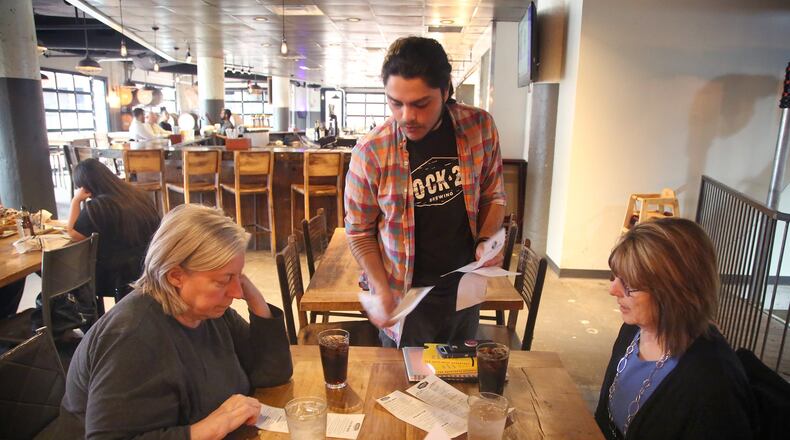Across the Miami Valley, restaurants and pubs and coffee shops are grappling with the threat of the new coronavirus or COVID-19, seeking to protect their employees and customers, while also worrying about the potential impact an outbreak could have on their business. Food-service operators are getting some guidance from local health officials on what — and what not — to do.
>> RELATED: NCAA won’t allow fans at tournament games
Steve Barnhart, founder and owner of Lock 27 brewpubs in Centerville and downtown Dayton, said he wanted to take precautions beyond the standard advice. That started with taking everything off the tables that are touched by customers, including menus and condiments. Salt and pepper are now available in paper packets, and ketchup and mustard are available on a plate, pumped from a bulk container. Draft beers are available in plastic cups upon request.
“We’re not doing any of this out of fear. We’re just trying to be proactive and take common-sense precautions,” Barnhart told the Dayton Daily News.
>> RELATED: A look inside Ohio’s coronavirus call center in Columbus
In a notice posted on the pub’s front door, the brewpub said, “We like to think of these steps as perhaps being a bit overly cautious in the current environment, but worth the extra effort to help protect out guests and staff.”
In a similar notice posted on the door of Ghostlight Coffee on Wayne Avenue in Dayton, owners said they changed their policies and switched to disposable (but compostable) serving utensils due to rising health concerns concerning the virus and in an effort “to keep our staff and customers as safe as possible.”
In addition to offering only disposable cups, plates and utensils, Ghostlight will not be serving coffee in customers’ personal reusable mugs or containers for now.
And, “We encourage customers to utilize contactless payments or credit cards to reduce staff contact with cash,” Ghostlight’s owners said.
>> RELATED: Officials cancel Winter Guard championships in Dayton
Megan Smith, founder and owner of St. Anne the Tart coffee and pastry shop on East Fifth Street in the St. Anne’s Hill Historic District in Dayton, said in addition to her shop’s enhanced sanitation efforts, she is closely watching more severely impacted regions of the country, including New York City, to see what restaurants and coffee shops are doing that makes sense and could be replicated in Dayton.
“I’m trying to just keep a pulse on what the community feels most comfortable with,” Smith said.
Shanon Morgan, executive director of the Miami Valley Restaurant Association, said she has fielded calls from member restaurants asking about the threat of the coronavirus.
“I’ve been advising everyone to stay calm but safe,” Morgan said “LOTS of hand-washing. If it’s a cashier environment, I’m suggesting that employees wear gloves when handling cash, and I’m recommending wiping down point-of-sale systems and credit-card terminals.”
Barnhart said he has not seen a significant impact on business, but that’s a concern for all restaurant and pub owners. And some have noticed a slowdown.
MacKenzie Manley, owner of Mack’s Tavern in Washington Twp., said fear of the coronavirus “has actually impacted us a whole bunch.”
>> RELATED: Catholic churches recommending people stay home if sick
Attendance at the tavern’s popular trivia and music bingo nights were down in recent days, as some regulars stayed away out of fear of the virus, Manley said.
Local health officials said their advice to restaurants starts with paying particular attention to routine cleaning.
“Frequently touched surfaces such as door handles, menus, railings and chairs should be routinely sanitized,” said Jennifer Wentzel, director of environmental health for Public Health – Dayton & Montgomery County, the city/county health department.
Wentzel and the health department offered this specific advice to restaurants seeking to protect customers:
• Keep restrooms stocked with soap and towels or hand dryers.
• Make sure alcohol-based hand sanitizer is available for customers to use, especially if there is no soap and water.
• Clean with soap and water to remove dirt and food from surfaces, then sanitize with chemicals or heat to reduce germs. Surfaces that look clean may still have germs on them that you can’t see. Sanitizing reduces these germs to safer levels.
• Clean and sanitize surfaces that are frequently touched. Surfaces such as remote controls, kitchen counters, door knobs, bathroom surfaces, keyboards, tables and chairs, and phones and tablets should be cleaned often.
• Use disposable gloves for cleaning and sanitizing. Throw them away before leaving the area and wash hands.
• If disinfectant wipes are used, do not reuse the wipes to wipe down multiple surfaces. Throw used wipes in the trash.
Staff Writer Amelia Robinson contributed to this report.
About the Author



